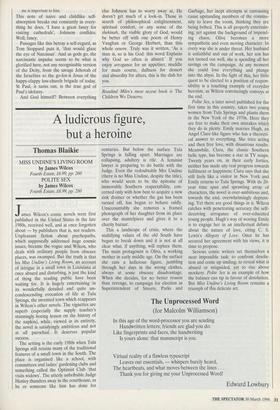A ludicrous figure, but a heroine
Thomas Blaikie
MISS UNDINE'S LIVING ROOM by James Wilcox Fourth Estate, £6.99, pp. 260 POLITE SEX by James Wilcox Fourth Estate, £6.99, pp. 280 James Wilcox's comic novels were first published in the United States in the late 1980s, received well, and at once forgotten about — by publishers that is, not readers. Unpleasant fiction about psychopaths, which supposedly addressed huge cosmic issues, became the vogue and Wilcox, who deals with ordinary people from obscure places, was swamped. But the truth is that his Miss Undine's Living Room, an account of intrigue in a small town in Louisiana at once absurd and disturbing, is just the kind of thing the reading public have been waiting for. It is hugely entertaining in its wonderfully detailed and quite un- condescending evocation of life at Tula Springs, the invented town which reappears in Wilcox's other novels. The vignettes are superb (especially the supply teacher's stunningly boring lesson on the history of the napkin), while, viewed in its entirety, the novel is satisfyingly ambitious and not at all parochial. It deserves popular success.
The setting is the early 1980s when Tula Springs still retains many of the traditional features of a small town in the South. The place is organised like a school, with committees and ladies' gardening clubs and something called the Optimist Club 'that visits widows'. The utterly unbribable Judge Henley thunders away in the courthouse, as he or someone like him has done for centuries. But below the surface Tula Springs is falling apart. Marriages are collapsing, adultery is rife. A feminist lawyer is preparing to do battle with the Judge. Even the redoubtable Mrs Undine (there is no Miss Undine, despite the title), who would seem to be the epitome of immovable Southern respectability, con- cerned only with how best to acquire a new sink drainer or whether the gas has been turned off, has begun to behave oddly. Unaccountably she removes a framed photograph of her daughter from its place over the mantelpiece and gives it to a charity bazaar.
This a landscape of crisis, where the stultifying values of the old South have begun to break down and it is not at all clear what, if anything, will replace them. The main protagonist is Olive, a working mother in early middle age. On the surface she cuts a ludicrous figure, jumbling through her days in the wrong clothes, always at some obscure disadvantage. When she decides, for no better reason than revenge, to campaign for election as Superintendent of Streets, Parks and Garbage, her inept attempts at canvassing cause upstanding members of the commu- nity to leave the room, thinking they are being bribed. This is all properly entertain- ing, yet against the background of impend- ing chaos, Olive becomes a more sympathetic and even moving character. In every way she is under threat. Her husband is unfaithful and out of work, her son has not turned out well, she is spending all her savings on the campaign. At any moment she could lose everything and plunge into the abyss. In the light of this, her little quest to be elected to a position of respon- sibility is a touching example of everyday heroism, as Wilcox convincingly conveys at the end.
Polite Sex, a later novel published for the first time in this country, takes two young women from Tula Springs and plants them in the New York of the 1970s. Here they are free to make their own mistakes which they do in plenty. Emily marries Hugh, an Angel Clare-like figure who has a theoreti- cal answer to everything. She tries acting and then free love, with disastrous results. Meanwhile, Clara, the classic Southern belle type, has become a star in TV soaps. Twenty years on, in their early forties, neither has made any real progress towards fulfilment or happiness; Clara says that she still feels like a visitor in New York and Emily returns to Tula Springs. With its 20- year time span and sprawling array of characters, the novel is over-ambitious and, towards the end, overwhelmingly depress- ing. Yet there are good things in it. Wilcox catches with penetrating accuracy the self- deceiving arrogance of over-educated young people. Hugh's way of wooing Emily is to engage her in an intellectual debate about the nature of love, citing C. S. Lewis's Allegory of Love. Once he has secured her agreement with his views, it is time to propose.
Serious comic writers set themselves a near impossible task: to confront desola- tion and come up smiling; to reveal what is absurd or misguided, yet to rise above mockery. Polite Sex is an example of how the balance can tip in favour of desolation. But Miss Undine 's Living Room remains a triumph of this delicate art.


























































 Previous page
Previous page